- Home
- Tom Stoppard
The Real Inspector Hound and Other Plays
The Real Inspector Hound and Other Plays Read online
Tom Stoppard
Tom Stoppard’s other work includes: Rosencrantz and Guildenstern Are Dead, Jumpers, Travesties, Night and Day, After Magritte, The Real Thing, Enter A Free Man, Hapgood, Arcadia, Indian Ink (a stage adaptation of his own play, In the Native State) and The Invention of Love. Arcadia won him his sixth Evening Standard Award, The Olivier Award and the Critics Award. Rosencrantz and Guildenstern Are Dead, Travesties and The Real Thing won Tony Awards.
His radio plays include: If You’re Glad I’ll Be Frank, Albert’s Bridge (Italia Prize), Where Are They Now?, Artist Descending A Staircase, The Dog It Was That Died, In the Native State (Sony Award).
Work for television includes: Professional Foul (Bafta Award, Broadcasting Press Guild Award). His film credits include Rosencrantz and Guildenstern Are Dead which he also directed (winner of the Golden Lion, Venice Film Festival).
also by the same author
ROSENCRANTZ AND GUILDENSTERN ARE DEAD
THE REAL INSPECTOR HOUND
ENTER A FREE MAN
AFTER MAGRITTE
JUMPERS
TRAVESTIES
DIRTY LINEN AND NEW-FOUND-LAND
NIGHT AND DAY
DOGG’S HAMLET, CAHOOT’S MACBETH
ROUGH CROSSING and ON THE RAZZLE
(adapted from Ferenc Molnár’s Play at the Castle
and Johann Nestroy’s Einen Jux will er sich machen)
THE REAL THING
THE DOG IT WAS THAT DIED AND OTHER PLAYS
SQUARING THE CIRCLE with EVERY GOOD BOY DESERVES
FAVOUR and PROFESSIONAL FOUL
HAPGOOD
DALLIANCE AND UNDISCOVERED COUNTRY
(a version of Arthur Schintzler’s Das weite Land)
ARCADIA
INDIAN INK
(an adaptation of In the Native State)
THE INVENTION OF LOVE
Screenplay
ROSENCRANTZ AND GUILDENSTERN ARE DEAD: THE FILM
Radio Plays
THE PLAYS FOR RADIO 1964–1983
IN THE NATIVE STATE
Fiction
LORD MALQUIST AND MR MOON
The Real Inspector Hound and Other Plays
TOM STOPPARD
Introduced by the Author
This collection copyright © 1993, 1996 by Tom Stoppard
The Real Inspector Hound copyright © 1968 by Tom Stoppard
After Magritte copyright © 1971 by Tom Stoppard
Dirty Linen and New-Found-Land copyright © 1976 by Tom Stoppard
Dogg’s Hamlet, Cahoot’s Macbeth copyright © 1980 by Tom Stoppard
All rights reserved. No part of this book may be reproduced in any form or by any
electronic or mechanical means, including information storage and retrieval systems,
without permission in writing from the publisher, except by a reviewer, who may quote
brief passages in a review.
Published simultaneously in Canada
Printed in the United States of America
Originally published in 1993 by Faber and Faber
FIRST AMERICAN EDITION
CAUTION: These plays are fully protected, in whole, in part, or in any form under the
copyright laws of the United States of America, the British Empire including the
Dominion of Canada, and all other countries of the Copyright Union, and are subject to
royalty. All rights, including professional, amateur, stock, motion picture, radio,
television, recitation, and public reading, are strictly reserved. Professional applications
for permission to perform them, etc., must be made in advance, before rehearsals begin,
to Peters, Fraser and Dunlop Ltd., 503/4 The Chambers, Chelsea Harbour,
London SW10 OXF, and amateur applications for permission to perform them, etc., must
be made in advance, before rehearsals begin, to Samuel French, Inc.,
45 West 25th Street, New York, NY 10010.
Library of Congress Cataloging-in-Publication Data
Stoppard, Tom.
The real Inspector Hound: and other plays / Tom Stoppard.
p. cm.
Originally published as: Plays one.
Contents: The real Inspector Hound—After Magritte—Dirty
linen—New-found-land—Dirty linen—Dogg’s Hamlet, Cahoot’s
Macbeth.
eBook ISBN-13: 978-0-8021-9533-3
I. Title.
PR6069.T6R4 1998
822V914—dc21 97-51694
Manufactured in the United States of America
Grove Press
841 Broadway
New York, NY 10003
98 99 00 01 10 9 8 7 6 5 4 3 2 1
CONTENTS
Preface
The Real Inspector Hound
After Magritte
Dirty Linen
New-Found-Land
Dirty Linen (concluded)
Dogg’s Hamlet, Cahoot’s Macbeth
PREFACE
The earliest of these plays, The Real Inspector Hound, grew out of a few pages I wrote in i960 and came back to in 1967. There were no critics in the story when I began it. Moon and Birdboot started off simply as two people in an audience, until it occurred to me that making them critics would give them something to be, and give me something to play with. As for Higgs, Moon’s first-string senior, he remained an off-stage character until (well into the 1967 version) I realized that he was the perfect answer to my problem: who was the corpse under the sofa?
I mention these things because nobody quite believes the playwright’s line about characters taking over a story. I never quite believe it myself. Looking back at Hound, I can’t see the point of starting to write it if one didn’t know the one thing which, more than any other, made the play worth writing: that Higgs was dead and under the sofa. When the idea came it seemed an amazing piece of luck, and I constantly remember that because my instinct, even now, is to want to know more about the unwritten play than is knowable, or good to know. So, whenever I finally set off again, knowing far too little and trusting in luck, I always gain courage from remembering the wonderful day when Moon and Birdboot led the lagging author to the discovery that – of course! – ‘It’s Higgs!’
After Magritte, Dirty Linen (incorporating New-Found-Land) and Dogg’s Hamlet, Cahoot’s Macbeth were all written for Ed Berman’s Inter-Action company between 1972 and 1980. Circumstances have changed even more dramatically for Pavel Kohout than for Ed Berman but I have let the original Introductions stand as a marker for the spirit of the time. The Almost Free Theatre, the Fun Art Bus and the rest of them were phenomena of a decade which was simultaneously playful and desperately serious; and perhaps that still describes Berman himself, now operating from a mooring on the Embankment, on a boat which only moves up and down with the tide, but which couldn’t be called mothballed while Berman is on the bridge.
Czechoslovakia is a different country now, a great joy to all concerned but not without its ironies, for while there is no longer a need for an underground Living Room Theatre, the above-ground theatre has lost the generous subsidies which came with obedience under Communism, and times are hard.
After Magritte often serves as a companion piece to The Real Inspector Hound, which I think is appropriate in at least one way: neither play is about anything grander than itself. A friendly critic described Hound as being as useful as an ivory Mickey Mouse. After Magritte may be slightly less useful than that. Both plays are performed more often than the other two. The ‘role of the theatre’ is much debated (by almost nobody, of course), but the thing defines itself in practice first and foremost as a recreation. This seem
s satisfactory.
TOM STOPPARD
1993
THE REAL
INSPECTOR HOUND
CHARACTERS
MOON
BIRDBOOT
MRS. DRUDGE
SIMON
FELICITY
CYNTHIA
MAGNUS
INSPECTOR HOUND
The first performance of The Real Inspector Hound was given on 17th June 1968, at the Criterion Theatre, London, when the cast was as follows:
MOON
Richard Briers
BRDBOOT
Ronnie Barker
MRS. DRUDGE
Josephine Tewson
SIMON
Robin Ellis
FELICITY
Patricia Shakesby
CYNTHIA
Caroline Blakiston
MAGNUS
Antony Webb
INSPECTOR HOUND
Hugh Walters
Directed by Robert Chetwyn
Designed by Hutchinson Scott
The first thing is that the audience appear to be confronted by their own reflection in a huge mirror. Impossible. However, back there in the gloom—not at the footlights—a bank of plush seats and pale smudges of faces. (The total effect having been established, it can be progressively faded out as the play goes on, until the front row remains to remind us of the rest and then, finally, merely two seats in that row—one of which is now occupied by MOON. Between MOON and the auditorium is an acting area which represents, in as realistic an idiom as possible, the drawing-room of Muldoon Manor. French windows at one side. A telephone fairly well upstage (i.e. towards MOON). The BODY of a man lies sprawled face down on the floor in front of a large settee. This settee must be of a size and design to allow it to be wheeled over the body, hiding it completely. Silence. The room. The BODY. MOON.
MOON stares blankly ahead. He turns his head to one side then the other, then up, then down—waiting. He picks up his programme and reads the front cover. He turns over the page and reads.
He turns over the page and reads.
He turns over the page and reads.
He turns over the page and reads.
He looks at the back cover and reads.
He puts it down and crosses his legs and looks about. He stares front. Behind him and to one side, barely visible, a man enters and sits down: BIRDBOOT.
Pause, moos picks up his programme, glances at the front cover and puts it down impatiently. Pause. … Behind him there is the crackle of a chocolate-box, absurdly loud, MOON looks round. He and BIRDBOOT see each other. They are clearly known to each other. They acknowledge each other with constrained waves, MOON looks straight ahead, BIRDBOOT comes down to join him.
Note: Almost always, MOON and BIRDBOOT converse in tones suitable for an auditorium, sometimes a whisper. However good the acoustics might be, they will have to have microphones where they are sitting. The effect must be not of sound picked up, amplified and flung out at the audience, but of sound picked up, carried and gently dispersed around the auditorium.
Anyway, BIRDBOOT, with a box of Black Magic, makes his way down to join MOON and plumps himself down next to him, plumpish middle-aged BIRDBOOT and younger taller, less-relaxed MOON.
BIRDBOOT (sitting down; conspiratorially): Me and the lads have had a meeting in the bar and decided it’s first-class family entertainment but if it goes on beyond half-past ten it’s self-indulgent—pass it on … (and laughs jovially) I’m on my own tonight, don’t mind if I join you?
MOON: Hello, Birdboot.
BIRDBOOT: Where’s Higgs?
MOON: I’m standing in.
MOON AND BIRDBOOT: Where’s Higgs?
MOON: Every time.
BIRDBOOT: What?
MOON: It is as if we only existed one at a time, combining to achieve continuity. I keep space warm for Higgs. My presence defines his absence, his absence confirms my presence, his presence precludes mine. … When Higgs and I walk down this aisle together to claim our common seat, the oceans will fall into the sky and the trees will hang with fishes.
BIRDBOOT (he has not been paying attention, looking around vaguely, now catches up): Where’s Higgs?
MOON: The very sight of me with a complimentary ticket is enough. The streets are impassable tonight, the country is rising and the cry goes up from hill to hill—Where—is—Higgs? (Small pause.) Perhaps he’s dead at last, or trapped in a lift somewhere, or succumbed to amnesia, wandering the land with his turn-ups stuffed with ticket-stubs.
(BIRDBOOT regards him doubtfully for a moment.)
BIRDBOOT: Yes. … Yes, well I didn’t bring Myrtle tonight—not exactly her cup of tea, I thought, tonight.
MOON: Over her head, you mean?
BIRDBOOT: Well, no—I mean it’s a sort of a thriller, isn’t it?
MOON: Is it?
BIRDBOOT: That’s what I heard. Who killed thing?—no one will leave the house.
MOON: I suppose so. Underneath.
BIRDBOOT: Underneath?!? It’s a whodunnit, man!—Look at it!
(They look at it. The room. The BODY. Silence.)
Has it started yet?
MOON: Yes.
(Pause. They look at it.)
BIRDBOOT: Are you sure?
MOON: It’s a pause.
BIRDBOOT: You can’t start with a pause! If you want my opinion there’s total panic back there. (Laughs and subsides.) Where’s Higgs tonight, then?
MOON: It will follow me to the grave and become my epitaph—Here lies Moon the second string: where’s Higgs? … Sometimes I dream of revolution, a bloody coup d’etat by the second rank—troupes of actors slaughtered by their understudies, magicians sawn in half by indefatigably smiling glamour girls, cricket teams wiped out by marauding bands of twelfth men—I dream of champions chopped down by rabbit-punching sparring partners while eternal bridesmaids turn and rape the bridegrooms over the sausage rolls and parliamentary private secretaries plant bombs in the Minister’s Humber—comedians die on provincial stages, robbed of their feeds by mutely triumphant stooges—
—and—march—
—an army of assistants and deputies, the seconds-in-command, the runners-up, the right-handmen—storming the palace gates wherein the second son has already mounted the throne having committed regicide with a croquet-mallet—stand-ins of the world stand up!—
(Beat.) Sometimes I dream of Higgs.
(Pause, BIRDBOOT regards him doubtfully. He is at a loss, and grasps reality in the form of his box of chocolates.)
BIRDBOOT (Chewing into mike): Have a chocolate!
MOON: What kind?
BIRDBOOT: (Chewing into mike): Black Magic.
MOON: No thanks.
(Chewing stops dead.)
(Of such tiny victories and defeats. …)
BIRDBOOT: I’ll give you a tip, then. Watch the girl.
MOON: You think she did it?
BIRDBOOT: No, no—the girl, watch her.
MOON: What girl?
BIRDBOOT: You won’t know her, I’ll give you a nudge.
MOON: You know her, do you?
BIRDBOOT (suspiciously, bridling): What’s that supposed to mean?
MOON: I beg your pardon?
BIRDBOOT: I’m trying to tip you a wink—give you a nudge as good as a tip—for God’s sake, Moon, what’s the matter with you?—you could do yourself some good, spotting her first time out—she’s new, from the provinces, going straight to the top. I don’t want to put words into your mouth but a word from us and we could make her.
MOON: I suppose you’ve made dozens of them, like that.
BIRDBOOT (instantly outraged): I’ll have you know I’m a family man devoted to my homely but good-natured wife, and if you’re suggesting—
MOON: No, no—
BIRDBOOT:—A man of my scrupulous morality—
MOON: I’m sorry—
BIRDBOOT:—falsely besmirched.
MOON: Is that her?
(For MRS. DRUDGE has entered.)
BIRDBOOT:—don’t be absurd, wouldn’t be seen dead with the old—ah.
(MRS. DRUDGE is the char, middle-aged, turbanned. She heads straight for the radio, dusting on the trot.)
MOON (reading his programme): Mrs. Drudge the Help.
RADIO (without preamble, having been switched on by MRS. DRUDGE):
We interrupt our programme for a special police message.
(MRS. DRUDGE stops to listen.)
The search still goes on for the escaped madman who is on the run in Essex.
MRS. DRUDGE (fear and dismay): Essex !
RADIO: County police led by Inspector Hound have received a report that the man has been seen in the desolate marshes around Muldoon Manor.
(Fearful gasp from MRS. DRUDGE.)
The man is wearing a darkish suit with a lightish shirt He is of medium height and build and youngish. Anyone seeing a man answering to this description and acting suspiciously, is advised to phone the nearest police station.

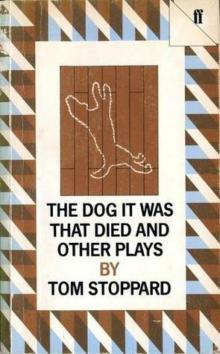 The Dog It Was That Died and Other Plays
The Dog It Was That Died and Other Plays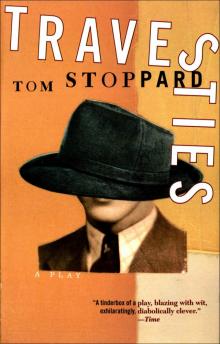 Travesties
Travesties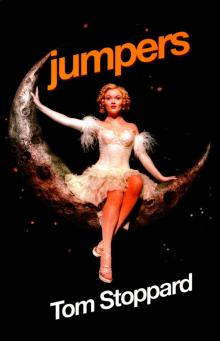 Jumpers
Jumpers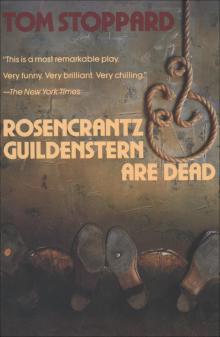 Rosencrantz and Guildenstern Are Dead
Rosencrantz and Guildenstern Are Dead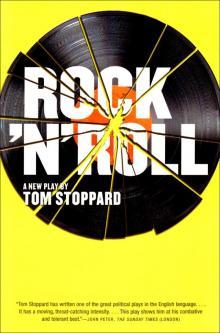 Rock 'N' Roll
Rock 'N' Roll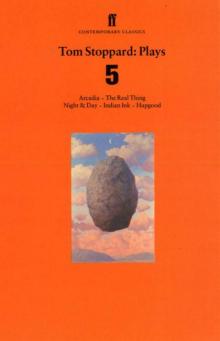 Plays 5
Plays 5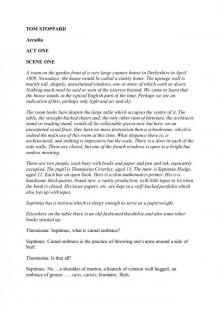 Arcadia
Arcadia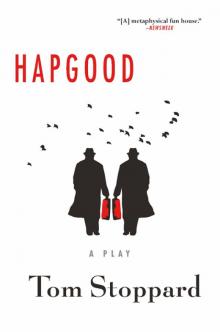 Hapgood
Hapgood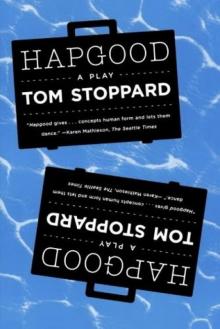 Hapgood: A Play
Hapgood: A Play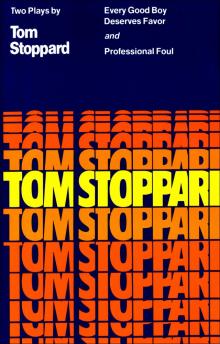 Every Good Boy Deserves Favor & Professional Foul
Every Good Boy Deserves Favor & Professional Foul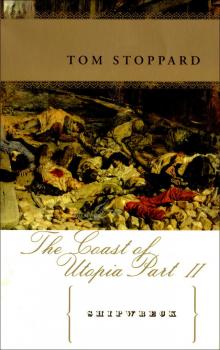 The Coast of Utopia: Voyage, Shipwreck, Salvage
The Coast of Utopia: Voyage, Shipwreck, Salvage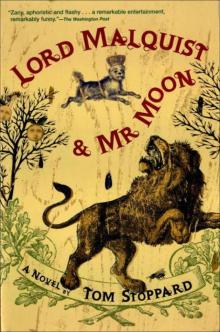 Lord Malquist & Mr. Moon
Lord Malquist & Mr. Moon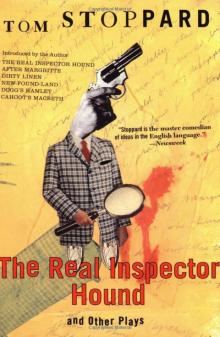 The Real Inspector Hound and Other Plays
The Real Inspector Hound and Other Plays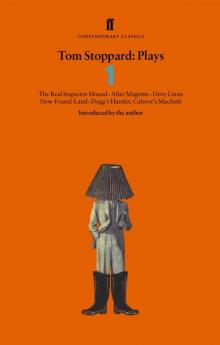 Tom Stoppard Plays 1
Tom Stoppard Plays 1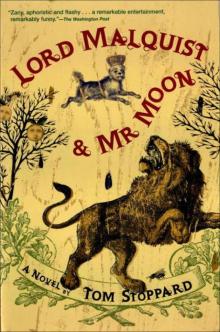 Lord Malquist & Mr. Moon: A Novel
Lord Malquist & Mr. Moon: A Novel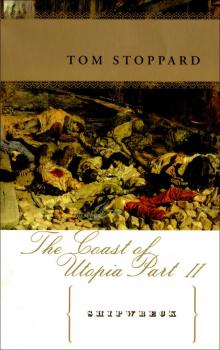 Shipwreck
Shipwreck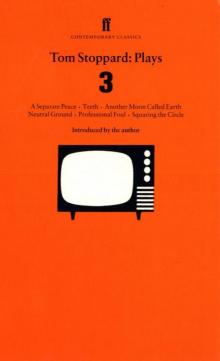 Tom Stoppard Plays 3
Tom Stoppard Plays 3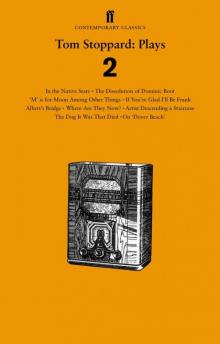 Tom Stoppard Plays 2
Tom Stoppard Plays 2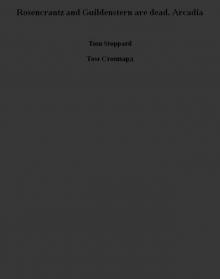 Rosencrantz and Guildenstern are dead. Arcadia
Rosencrantz and Guildenstern are dead. Arcadia